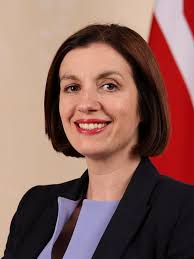Bridget Phillipson: A Glimpse into Her Political Journey

Introduction
Bridget Phillipson, the Shadow Secretary of State for Education, has become a significant figure in UK politics, particularly within the Labour Party. Her role is crucial as education remains a hot topic, especially given the impact of the COVID-19 pandemic on learning and school management. As the UK navigates economic challenges and societal changes, her policies and ideals are increasingly pertinent to the nation’s future.
Political Background
Bridget Phillipson was first elected as the Member of Parliament for Houghton and Sunderland South in 2012. Since then, she has built a reputation as a committed advocate for education and social justice. Leveraging her background as a teacher, she has tirelessly campaigned for enhanced educational resources and has been vocal about the necessity of equal opportunities within the education system. Phillipson’s parliamentary initiatives often focus on issues affecting children and educators, demonstrating her dedication to transforming the educational landscape.
Recent Developments
In the wake of the recent government policies on education funding and governance, Phillipson has been active in critiquing current strategies while proposing alternative solutions. Recent statements she made during Labour’s annual conference highlighted her party’s intentions to reverse cuts to school budgets and increase teacher salaries, aiming to attract more talent into the profession. Furthermore, she insists on the importance of maintaining mental health support within schools as students continue to recover from the effects of the pandemic.
Impact and Public Response
Bridget Phillipson’s push for a more inclusive educational framework has resonated positively with many educators and parents, who view her as a hopeful beacon for change. Surveys indicate that public trust in the Labour Party’s approach to education has improved following her elevated profile. Her speeches often draw attention across various media platforms, granting her significant influence over public discourse regarding education policy.
Conclusion
As Bridget Phillipson continues to consolidate her position as a key player in UK politics, her influence on educational reform is becoming increasingly apparent. The focus on education is critical for the Labour Party, especially as the next general election approaches. Her initiatives not only seek to restore trust in public education but also aim to foster a generation of young people equipped for the challenges of tomorrow. Phillipson’s rise within the political landscape illustrates the growing recognition of education as a cornerstone of societal progress, and as she moves forward, her actions will likely shape the educational policies of any future government.









